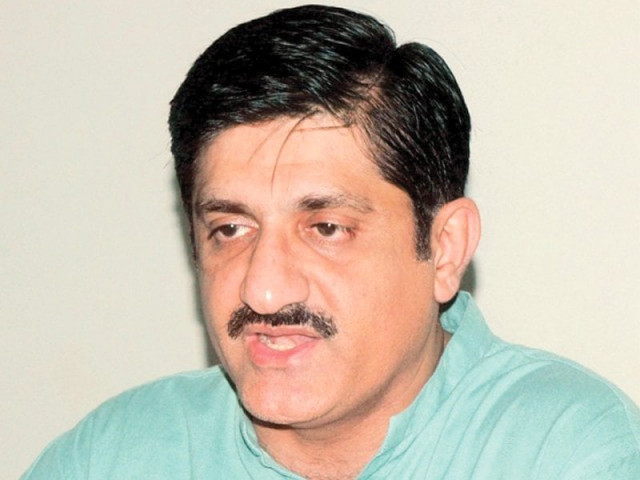Sindh cabinet proposes to turn Governor House into museum
Thar, parts of Umerkot declared calamity-hit areas

Murad Ali Shah. PHOTO: EXPRESS
The meeting was presided over by Chief Minister Murad Ali Shah. It was attended by all the eight ministers and two advisers who took oath on Sunday along with the chief secretary, inspector-general of police and other secretaries.
Addressing the cabinet, the CM said the last Pakistan Peoples Party-led Sindh government had only passed a three-month budget to enable the caretaker and new government to make necessary expenditures till September. "Now, we have to make a new budget before September 30 and present it in the House," he said. According to the CM, the financial condition of the province was not very good as it had not received the funds it was expecting from the federal government.
The cabinet also discussed a case being heard in the apex court regarding utilisation of luxury vehicles. The CM directed the chief secretary to put the item on the agenda of the next cabinet meeting so that appropriate action could be taken in this regard.
The cabinet also took up the issue of Governor House which would not be inhabited by the Pakistan Tehreek-e-Insaf governor as pledged by Prime Minister Imran Khan while he addressed the nation on Sunday. The CM asked a senior Board of Revenue (BoR) member, Iqbal Durrani, regarding the title of the property of Governor House.
Murad Ali Shah takes stock of Karachi's street crime, water crisis
The meeting was informed that Governor House belonged to the Sindh government. It was proposed that the building of Governor House be converted into a museum and its open space into a public park if the governor chose to vacate it.
Law and order
The IG and Home Secretary Mohammad Haroon briefed the cabinet about the law and order situation in the province.
The home secretary informed the cabinet that the overall law and order situation in the province was under control. Regarding security preparations for Eidul Azha, the meeting was informed that necessary instructions had been issued to commissioners, deputy commissioners (DCs) and DIGs regarding maintenance of law and order and cleanliness during Eid.
All the DCs have been authorised to issue licences for collection and sale of animal hides during Eid after necessary verification and completion of legal formalities, the cabinet was informed.
The cabinet was also informed that a code of conduct had been issued in both English and Urdu regarding the collection of hides during Eid. The list of banned organisations had been publicised and provided to all the authorities concerned so that strict vigilance could be kept on their activities.
The IG briefed the cabinet on the monitoring of Sindh's borders with Balochistan and Punjab. The CM recalled that terrorists were successful in carrying out an explosion in Shikarpur during last Eidul Azhar. He specifically directed the police to take strict measures in the entire belt of Jacobabad, Shikarpur and their adjoining districts.
Water crisis
While discussing water supply schemes in Karachi, the CM directed the local government minister to start work on war footing for a desalination plant in Karachi so that water issue in the city is resolved as early as possible.
Irrigation Secretary Jamal Shah informed the cabinet that water shortage had severely affected rice crop in the province.
The meeting was briefed that the provincial government was misled by an optimistic forecast issued by the Indus River System Authority (Irsa) in March. According to the forecast, Sindh was to face 31% water shortage in early kharif season. Later, Irsa revised the estimate in another forecast to 42%. However, the actual water shortage was recorded at 58%, the cabinet was informed.
The irrigation department said construction of Diamer-Bhasha dam would help resolve water shortage for crops. The department also suggested adopting water conservation techniques to save water, including replacing conventional practices of irrigation to more efficient modern ways. It was also suggested that rice sowing season be delayed by one month.
The irrigation department proposed strict implementation of embargo on rice cultivation on command of perennial canals such as Rohri and Nara canals. The cabinet also discussed tapping underground water resources for agriculture and promotion of saline water agriculture. The department also suggested construction of Sehwan carrage complex with Manchhar Lake as reservoir and conversion of Phuleli Canal into a perennial canal.
Kinjhar, Haleji and Hadero lakes can also be developed as a reservoir for water supply to Karachi and KB Feeder, the CM remarked.
CM Shah unimpressed with premier's speech
The CM directed cabinet members to visit barrages to get briefing on the spot and report him. Mir Shabbir Bijarani was asked to visit Guddu Barrage while Adviser to CM Mohammad Bux Maher was told to visit Sukkur Barrage. Visit to Kotri Barrage was assigned to Ismail Rahu while Syed Sardar Ali Shah and Makhdoom Mehboobuz Zaman were asked visit left bank canals of Sukkur Barrage.
The CM said he had banned cultivation of rice on the left bank of Indus River. He directed the chief secretary to seek reports from all the DCs concerned about rice cultivation on the left bank of the river so that action could be taken.
Thar drought
Durrani briefed the cabinet on drought situation in Thar.
The cabinet was informed that Mithi taluka received only 58 millimetres (mm) of rainfall between June and August. Islamkot received 24 mm, Diplo 51mm, Kaloi 10 mm, Chachhro 105 mm, Dahli 120 mm and Nagarparkar 40 mm of rainfall.
All the 167 dehs of all talukas of Tharparkar and 25 dehs of Umerkot were declared calamity-hit areas. The cabinet was informed that of the 1,617,175 total population of Thar, 216,206 people had been affected by drought.
The BoR recommended distribution of wheat and release of funds for relief work in the drought-affected areas. The cabinet approved a relief package for Thar which included free monthly distribution of 50 kilogrammes of wheat per family.
The CM tasked Zaman and Sardar with visiting Thar to recommend relief measures so that proper relief could be provided to the drought-affected people.



















COMMENTS
Comments are moderated and generally will be posted if they are on-topic and not abusive.
For more information, please see our Comments FAQ